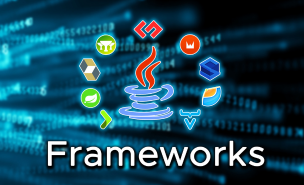Frameworks(Hibernate and Spring)
A Java frameworks course is designed to provide individuals with a comprehensive understanding of various frameworks that enhance and simplify Java application development. These frameworks offer pre-built solutions, reusable components, and established architectural patterns, allowing developers to focus on building robust and efficient applications rather than reinventing the wheel.

Overview
A Java frameworks course is designed to provide individuals with a comprehensive understanding of various frameworks that enhance and simplify Java application development. These frameworks offer pre-built solutions, reusable components, and established architectural patterns, allowing developers to focus on building robust and efficient applications rather than reinventing the wheel.
Course Description
Here’s a concise breakdown of the Hibernate and Spring Framework topics you provided:
Hibernate
- Introduction to ORM: Understanding Object-Relational Mapping (ORM) and how Hibernate implements it.
- Core Components of Hibernate: Key elements like SessionFactory, Session, Transaction, and Configuration.
- CRUD Operations: Basic operations—Create, Read, Update, and Delete—using Hibernate.
- Hibernate Mismatches: Issues related to data mismatches and solutions.
- Granularity Problem: Challenges related to the granularity of updates or transactions.
- Relationships Problem: Issues in managing associations like one-to-many, many-to-one, etc.
- Inheritance Problem: Handling inheritance strategies (single table, joined, and table-per-class).
- Primary Key Generators: Strategies for generating primary keys (e.g., identity, sequence, and assigned).
- HQL (Hibernate Query Language): Introduction to querying databases using HQL.
- Native SQL Queries: Using native SQL with Hibernate for more control.
- Hibernate Criteria API: Programmatic approach to querying and filtering data.
Spring Framework
Introduction
- Spring Modules: Overview of Spring's various modules such as Core, AOP, JDBC, MVC, etc.
Spring Core
- Spring Bean: Understanding Spring beans and their role in the application.
- Spring Core Container: The core container includes the BeanFactory and ApplicationContext.
- Dependency Injection (DI): Fundamental concept of DI for managing object creation.
- Types of DI: Constructor-based and setter-based injection.
- Spring Inheritance: Using inheritance in Spring bean configurations.
- Working with Collections: Using Spring to manage collections in beans (List, Map, etc.).
- Autowiring: Automatic injection of dependencies using annotations or XML.
- Dependency Check: Ensuring that required dependencies are correctly wired.
- Aware Interfaces: Spring interfaces that allow access to specific beans (e.g., BeanNameAware, ApplicationContextAware).
- Bean Lifecycle: The lifecycle of Spring beans—initialization, destruction, etc.
- Spring Core Annotations: Using annotations like @Component, @Autowired, @Value, etc.
Spring AOP (Aspect-Oriented Programming)
- Introduction: Basics of AOP and how Spring uses it for cross-cutting concerns like logging and transactions.
Spring JDBC
- Introduction: Basics of using Spring for JDBC operations.
- Traditional vs. Spring JDBC: Comparison between traditional JDBC and Spring’s simplified approach.
- JDBC Template: Using Spring's
JdbcTemplatefor efficient database operations.
Spring ORM
- Spring ORM: Integration of Spring with ORM frameworks like Hibernate for managing database operations.
Spring MVC (Model-View-Controller)
- Introduction to MVC: Basics of the MVC design pattern in Spring.
- Steps in Spring MVC Web Application: Request flow and dispatcher servlet configuration.
- Spring MVC Workflow: How Spring handles HTTP requests, controllers, and views.
- Spring Controllers: Defining controllers and handling requests in Spring MVC.
- Spring Form Validations: Validating form data using Spring MVC.
- Spring Form Tags: Using Spring’s form tags for creating and binding forms in views.
Spring Boot
- Introduction: Simplified approach to setting up Spring applications using Spring Boot.
- REST Implementation: Building RESTful web services using Spring Boot.
Spring Data JPA
- Introduction to Spring Data JPA: Simplifying database access with Spring Data JPA.
- Repositories: Using
JpaRepositoryfor easy CRUD operations with JPA entities.
This breakdown offers a focused yet comprehensive guide to the topics related to Hibernate and Spring Framework, ensuring that you can quickly grasp the essential concepts.
Course Key Features
- Classroom and Online Training: Learn from the comfort of your home or in-person at our Hyderabad center.
- IT Experts as Trainers: Get trained by experienced professionals with real-world industry insights.
- Industry-Relevant Curriculum: Our course covers essential Java concepts, focusing on real-world applications.
- Hands-on Projects: Work on real-time use cases and projects to enhance practical knowledge.
- One-on-One Mentoring: Personalized attention from mentors to guide you through the learning process.
- Flexible Schedules: Choose from convenient training schedules to fit your lifestyle.
- 8 Hours of Lab Support: Daily lab sessions to practice and apply what you've learned.
- Pre-Assessment Questions: Assess your knowledge before the course begins.
- Comprehensive Course Material: Get access to well-structured study materials for self-paced learning.
- Lifetime Valid Swhizz Certification: Earn a certificate recognized for its credibility and validity.
- Resume Building: Assistance in creating a professional resume to stand out to employers.
- Interview Guidance: Receive expert tips on how to prepare for and excel in job interviews.
- Mock Interviews: Simulate real job interviews for better preparation.
- Job Drives with Top Companies: Access exclusive hiring opportunities through our extensive network.
- Internship Opportunities: Gain industry exposure through internships with leading companies.
- Tie-ups with 100+ Clients: Partnered with top firms for job placements and career support.
Join Swhizz Technologies today to kickstart your career in Java Fullstack
Benefits
- Comprehensive Curriculum: Covers all key concepts from basics to advanced topics.
- Hands-on Learning: Apply concepts through real-time projects.
- Expert Mentors: Learn from industry experts with practical experience.
- 100% Placement Assistance: Resume building, interview preparation, and job placement support.
Enroll now to master Java and pave your way to a successful career in software development!
Who Should Attend
· Graduates
· Post Graduates
· Career Gap people
· Software Developers
· Operations Professionals
· Quality Assurance Engineers
· System Administrators
· IT professionals
· Associates
Course Outline for
Introduction to Java Programming
- Stand-alone applications and servlets
- Compiling source code into bytecode
- Overview of class libraries
Object-Oriented Programming with Java
- The object paradigm
- Encapsulation, inheritance and polymorphism
- OO analysis and design: “Is a” and “Has a”
- Designing an OO application step by step
- Diagramming object structure with Unified Modeling Language (UML)
- Java’s object-oriented features
- Instantiating objects from classes
- Aggregation and composition
- Extending existing classes
- Overloading and overriding methods
Structure of the Java Language
- Language syntax
- Declaring and initializing variables
- Declaring and using arrays
- Upcasting, downcasting and autoboxing
- Flow control
- Invoking methods and passing parameters
- Conditionals and loops
- Handling exceptions with try and catch
- Defining classes
- Fields (instance data)
- Methods (functions)
- Abstract classes and interfaces
- Organizing classes with packages and modifiers
- Composition vs. inheritance
- Building the components of a Java program
- Leveraging generics with the collections API
- Developing new classes
- Compiling and debugging
Developing GUIs
- Foundations of user interfaces
- Basic GUI widgets
- Event-driven programming
- Benefits of a portable windowing library
- Java Foundation Classes (JFC)
- Creating Swing components
- Adding Swing components to containers
- Arranging Swing components using layout managers
- Dialogs and message boxes
- Event handling
- Registering event handlers
- Inner classes and top-level classes
Storing and Retrieving Data with File I/O
- Java streams
- Streams, Readers and Writers
- Catching and throwing exceptions
- Formatting text output
- Files and directories
- Reading and writing files
- Creating, deleting and renaming files
- Obtaining directory and file information
Working with Relational Databases
- JDBC database access
- Leveraging the JDBC API
- Choosing database drivers
- Connecting to a database
- Improving performance with prepared statements and stored procedures
- Submitting SQL statements
- Retrieving and processing results
Java Development Tools
- Java Development Kit (JDK)
- Compiler (javac)
- Javadoc utility
- Java Archive (JAR) utility
- Java Integrated Development Environments (IDEs)


